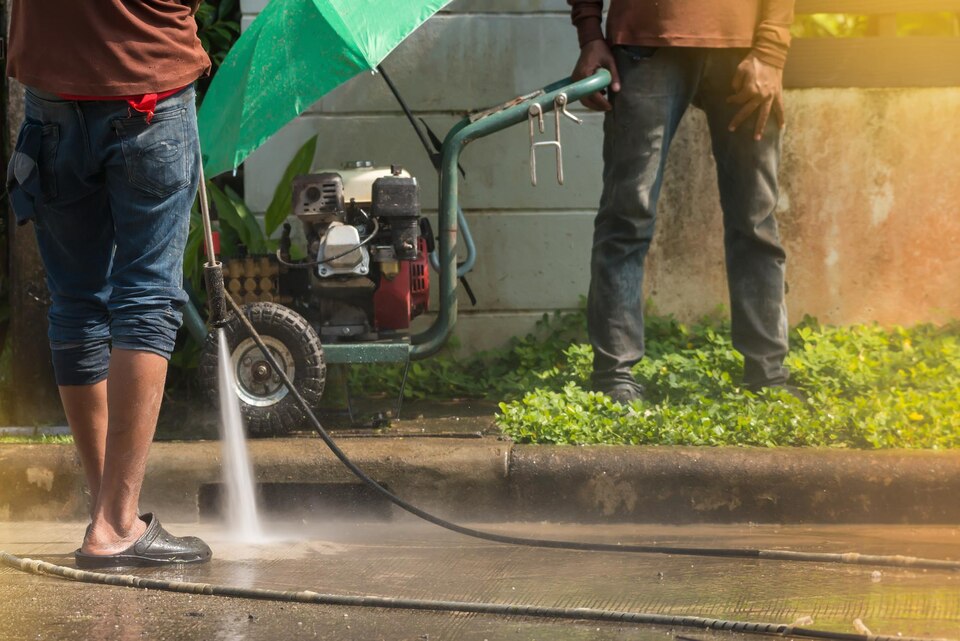Is Electric or Gas Powered Pressure Washer Better?
When it comes to choosing a pressure washer for your home or business, one of the first and biggest decisions you’ll face is: electric vs. gas. Each type has its strengths and trade-offs, and the right choice really depends on what you plan to do, how often you’ll do it, and how much maintenance you’re willing to tolerate. Here at Serv-Us, we’ve seen both types in action, so let’s dig into the differences so you can decide which direction makes sense for your cleaning needs.
What Do Pressure Washers Do?
A pressure washer is a powerful tool for outdoor cleaning. It takes water from your garden hose and uses a pump to spray it at high pressure.
This high-pressure stream easily removes dirt, grime, moss, and loose paint. The main difference in these tools comes from the pump’s power source: either an electric motor or a gas engine.
The Key Measures: PSI and GPM
You will see two numbers on every pressure washer: PSI and GPM. PSI, or pounds per square inch, measures the water’s force.
GPM, or gallons per minute, measures the volume of water. More PSI blasts away tough grime, and more GPM rinses it away faster. A good machine balances both.
The Case for Electric Pressure Washers
An electric pressure washer uses an electric motor and is plugged into a standard outlet (or sometimes uses a battery). It tends to be lighter-weight and lower maintenance. Starting an electric model is effortless. You just plug it into a proper GFCI outlet and turn it on.
Common Jobs for Electric Models
Electric models excel at light-to-medium-duty cleaning tasks. They provide enough power for most upkeep around the house.
Consider an electric unit for these jobs:
- Washing your cars, boats, or RVs
- Cleaning outdoor patio furniture
- Spraying down small decks and patios
- Removing light mildew from siding
- Cleaning grills and garbage cans
At Serv-Us, we offer used and new electric models for any job. Contact us at (973) 714-1718 to learn more today.
The Electric Cord Conundrum
The main limitation of an electric washer is the power cord. You are tethered to an electrical outlet. This can be frustrating if you have a large property. You must also be careful not to run over the cord or get it wet in the wrong places.
The Case for Gas-Powered Pressure Washers
A gas pressure washer uses a gasoline engine to power the pump. It offers more oomph (higher pressure and flow) and greater mobility (no cord limitation) but carries more complexity.
When you need serious power, a gas engine delivers. Gas models are built for heavy-duty and large-scale jobs.They produce significantly higher PSI and GPM. This means they can clean deep, stubborn stains that electric models cannot touch. The biggest benefit is portability. You are not limited by a cord and can take the washer anywhere on your property.
Common Jobs for Gas Models
Gas washers are the right tool when you need maximum force. They cut cleaning time on big projects.
A gas machine is ideal for these tasks:
- Cleaning large concrete driveways or sidewalks
- Washing the siding on a two-story home
- Prepping a large deck for restaining
- Removing graffiti or stripping old paint
- Cleaning farm equipment
At Serv-Us, we offer both used and new gas models for your next project.
The Demands of Gas Engine Upkeep
This extra power comes with more responsibility. Gas engines require the same care as a lawnmower. You must perform regular maintenance. This includes checking and changing the oil, managing fuel levels, and replacing spark plugs.You also need to winterize the engine and pump. This protects it from freezing damage during cold months.
Let’s Talk About Noise and Fumes
Electric: quieter, no fumes, lighter weight, easier to store/use indoors or in semi-enclosed spaces (though you’ll still want ventilation).
Gas: louder, emits exhaust, heavier, more cumbersome, but more flexible if you’re out away from power outlets or doing big jobs.
Comparing the Price Tag
Electric washers have lower upfront cost, simpler setup, fewer moving parts, and generally less maintenance (no oil changes, carburetor issues, fuel staleness, etc).
Gas washers cost more (both initial and operationally), require more upkeep (engine maintenance, fuel management, heavier construction), but for frequent or heavy-duty use they may offer better long-term value.

Is Electric or Gas Powered Pressure Washer Better?
There’s no one-size-fits-all best pressure washer. The best type for you depends on how big your cleaning tasks are, how often you’ll use the machine, how much maintenance you’re willing to deal with, and what your budget is.
If your projects are modest in scope and frequency, then an electric pressure washer offers an excellent blend of simplicity, cost-effectiveness and convenience. If you’re tackling large surfaces, tough stains, frequent use, or commercial work, then a gas pressure washer is likely better suited, even though it demands more upkeep.
Here at Serv-Us, our recommendation: start with your needs, not the specs. Match the machine to the job, not the other way around. That way you get the right tool for the work, avoid spending more than you need, and avoid frustration with under-powered gear or over-complex machines. Visit our location at 69J Wesley Street South Hackensack, New Jersey 07606.
